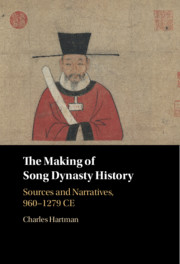Book contents
- The Making of Song Dynasty History
- The Making of Song Dynasty History
- Copyright page
- Dedication
- Contents
- Figures
- Tables
- Preface
- A Note on the Text
- Introduction
- Part I Sources
- Part II Narratives
- 6 Political Precedents and the Origins of Historical Narrative
- 7 Song History as Grand Allegory
- 8 An Empire of Benevolence
- 9 From Soldier to Sage
- 10 The Lineage of Evil
- 11 The Rhythms of Song History
- Bibliography
- Index
10 - The Lineage of Evil
Benevolence Undermined
from Part II - Narratives
Published online by Cambridge University Press: 24 September 2020
- The Making of Song Dynasty History
- The Making of Song Dynasty History
- Copyright page
- Dedication
- Contents
- Figures
- Tables
- Preface
- A Note on the Text
- Introduction
- Part I Sources
- Part II Narratives
- 6 Political Precedents and the Origins of Historical Narrative
- 7 Song History as Grand Allegory
- 8 An Empire of Benevolence
- 9 From Soldier to Sage
- 10 The Lineage of Evil
- 11 The Rhythms of Song History
- Bibliography
- Index
Summary
Chapter 11, “The Lineage of Evil” describes the emergence of the narrative that a series of “nefarious ministers” (jianchen) successively arrogated imperial authority and acted to thwart the dynasty’s fundamentally benevolent character. Unlike the first two narrative clusters, this cluster is negative and thus introduces an element of moral tension into the larger allegorical narrative. The rhetoric of this struggle invokes the Confucian dichotomy between gentlemen (junzi) versus petty men (xiaoren), the former’s actions based on his sense of what is “open/fair/public” (gong) and the latter’s on what is “selfish/private” (si). Although the collected biographies of the nefarious ministers in Song History chapters 471–474 codified the group’s membership, a precise lineage was never fixed in Song. Although the junzi/xiaoren distinction was fundamental to Song political discourse from the Qingli period, the notion of a lineage of nefarious ministers took shape only after the assassination of Han Tuozhou in 1207, when the attendant historical revisionism cast him as parallel “type” with Qin Gui. After Shi Miyuan deposed the rightful heir and imposed Emperor Lizong on the throne in 1224, this conception of a lineage of evil ministers quickly morphed into a formidable political and historiographical weapon. The daoxue historian Lü Zhong, for example, catalogues the lineage of evil as Wang Anshi, Cai Jing, Qin Gui, Han Tuozhou, and Shi Miyuan. In the grand allegory, these “petty men,” acting in their own self-interest, had thwarted the benevolent governance of the founders, and this opposition thus explained the obvious failure of Confucian institutionalism to attain its professed political goal of replicating the governance of antiquity.
Keywords
- Type
- Chapter
- Information
- The Making of Song Dynasty HistorySources and Narratives, 960–1279 CE, pp. 312 - 328Publisher: Cambridge University PressPrint publication year: 2020

